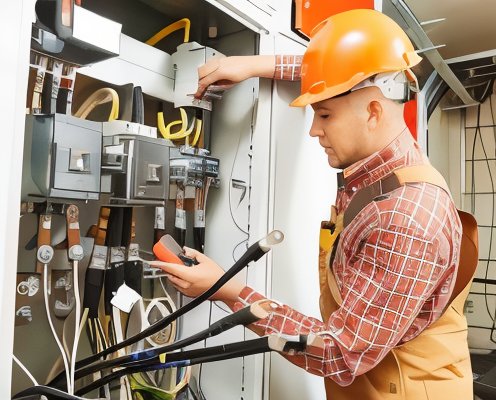In our modern homes, electricity is everywhere, powering our daily lives with comfort and convenience. While it might be tempting to tackle some home projects yourself, working with electricity is a serious matter. Unlike fixing a leaky tap or painting a wall, mistakes with electrical systems can be very dangerous, leading to electric shocks, fires, or damage to your valuable appliances.
Knowing when to call a professional electrician is one of the most important decisions a homeowner can make. It’s not about lacking skill, but about ensuring the safety of your family and the proper functioning of your entire home’s electrical system. Electricians have the training, tools, and experience to handle complex and potentially hazardous tasks.
This guide will help you understand clearly when it’s time to step back and bring in a qualified expert to handle your electrical needs, ensuring peace of mind and safety.
What Electrical Jobs Are Definitely for a Professional?
Some electrical tasks are simply too complex or dangerous for anyone but a trained and licensed electrician to handle. These are the jobs where safety codes, specialized tools, and deep knowledge are absolutely critical.
For instance, any work involving your main electrical panel (or breaker box) should always be done by an expert. This is the heart of your home’s electrical system, where power enters your house. Upgrading an old panel, replacing the main breaker, or adding new circuits to it are high-risk jobs that can lead to electrocution or widespread power problems if done incorrectly. Similarly, whole-house rewiring, whether for an old house or a major renovation, is a massive and intricate project that requires professional planning and execution.
Installing new dedicated circuits for heavy-duty appliances like air conditioners, electric stoves, or water heaters also falls into the professional category. These appliances draw a lot of power and need their own, properly sized wiring and breakers. Lastly, any outdoor wiring installation, especially for pools, hot tubs, or extensive landscape lighting, requires specific knowledge of how to protect against water and weather, and must comply with very strict safety standards. These jobs often require special permits and inspections by local authorities, which a professional electrician can manage.
What Are the Warning Signs of Electrical Problems That Need an Expert?
Your home’s electrical system often gives off clear warning signs when something is wrong. Paying attention to these signals can help you call an electrician before a small problem becomes a dangerous one.
One common sign is frequently tripping circuit breakers or regularly blown fuses. If a breaker repeatedly trips on the same circuit, it’s a strong indication of an overloaded circuit, a short circuit, or a ground fault – all issues that need professional diagnosis. Similarly, flickering or dimming lights, especially when an appliance turns on, suggest that your wiring might be old, overloaded, or have loose connections that an electrician can identify.
Any unusual burning smells coming from outlets, switches, or the electrical panel, or seeing scorched outlets or switch plates, demands immediate professional attention. These are clear signs of overheating wires, which can lead directly to an electrical fire. Another red flag is buzzing or humming sounds coming from outlets, switches, or your breaker panel, as this can indicate loose wiring or a faulty component. Lastly, if you ever feel a tingling sensation or a mild shock when touching an appliance or switch, it means there’s a serious grounding issue or faulty wiring that poses an immediate danger and requires an electrician’s urgent response.
Why Is Hiring a Licensed and Qualified Electrician Important?
Choosing to hire a licensed and qualified electrician isn’t just a good idea; it’s a critical safety measure and a smart investment in your home.
Firstly, and most importantly, safety is paramount. Licensed electricians have undergone extensive training and apprenticeships, and they understand complex electrical systems, safety protocols, and emergency procedures. They know how to prevent shocks, fires, and other hazards that can arise from improper wiring. In Malaysia, this often means they are registered with bodies like Suruhanjaya Tenaga (Energy Commission), ensuring they meet national standards.
Secondly, a professional electrician ensures your work is up to code. Building codes exist to protect homeowners and ensure electrical installations are safe and reliable. An experienced electrician is current on all local (Malaysian) and national electrical codes, making sure your repairs or installations comply, which is important for inspections, insurance, and future property value. They also have the right tools and equipment for complex jobs, from specialized testers to safety gear, which most homeowners don’t possess.
Finally, hiring a professional provides peace of mind and protection. They are typically insured, meaning if an accident happens or damage occurs during the work, you are protected. Many also offer warranties on their work, giving you confidence that the repair or installation is done correctly and will last. Attempting complex electrical work yourself without proper knowledge or tools can void home insurance, create hidden dangers, and lead to more expensive repairs down the line.
What Should You Ask or Check When Hiring an Electrician?
Once you decide you need a professional, knowing how to choose the right one is essential. Asking the right questions and checking certain details can help you find a reliable and skilled electrician.
First, always ask for proof of their license and insurance. In Malaysia, this means checking for their Suruhanjaya Tenaga registration or other relevant certifications. A licensed electrician has met the necessary training and safety standards, and insurance protects you from liability if an accident occurs on your property. Don’t be afraid to ask for their license number and verify it if possible.
Next, ask for references from previous clients. A reputable electrician should be happy to provide contact details for past customers you can speak to about their experience. Also, always get a detailed written quote that breaks down the cost of labor, materials, and any potential extra fees. Be wary of estimates that seem unusually low or are given without a thorough inspection. This helps avoid surprises later.
Finally, discuss their warranty or guarantee on their work. A professional will stand behind their repairs and installations, offering a warranty on their labor and sometimes on the parts they use. Clarifying this upfront ensures you have recourse if something goes wrong after they leave. Also, ask about their experience with the specific type of work you need done; a specialist in new home wiring might not be the best for a complex troubleshooting job, for instance.
Conclusion
Knowing when to hire an electrician is about more than just convenience; it’s a fundamental aspect of home safety and maintenance. While simple tasks can be handled by a handy homeowner, anything involving your main electrical panel, new circuits, outdoor wiring, or persistent warning signs of deeper problems calls for a professional.
Entrusting your electrical work to a licensed, insured, and reputable electrician ensures that the job is done correctly, safely, and in line with all necessary codes. By asking the right questions and prioritizing safety, you’re not just fixing a problem; you’re investing in the long-term well-being of your home and everyone in it. Remember, when in doubt, it’s always best to call an expert.

